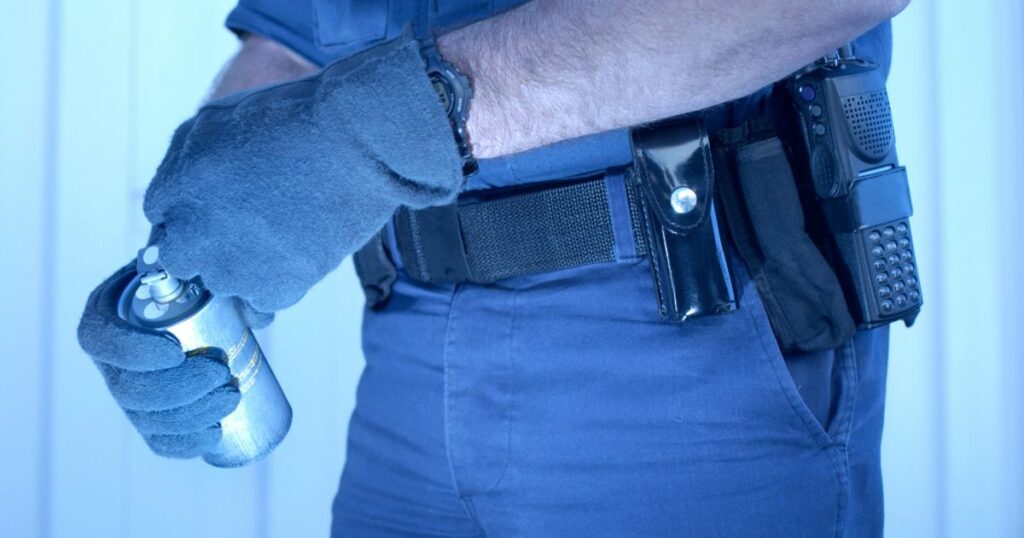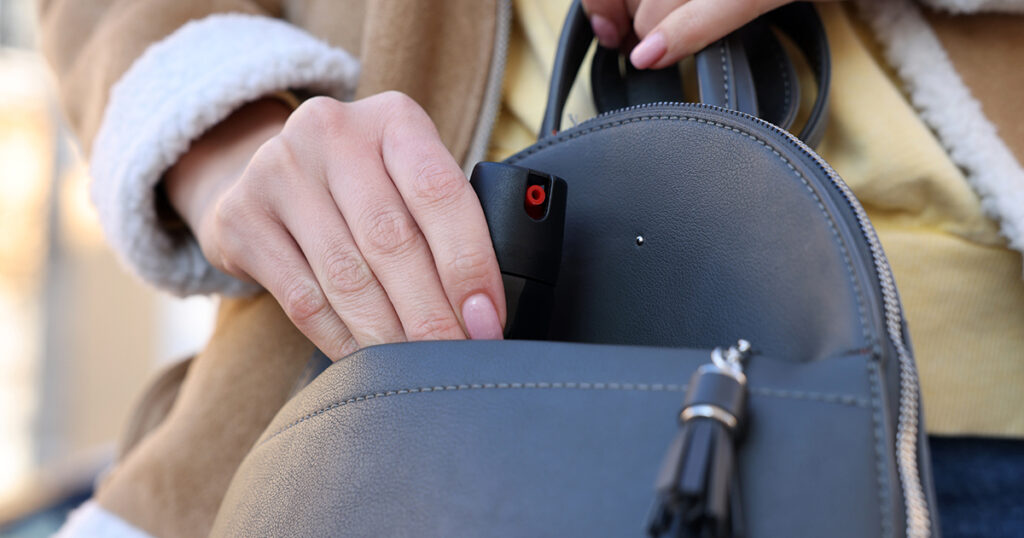Imagine being amidst a bustling protest or facing an unexpected threat – moments where tear gas and pepper spray could be used. These non-lethal weapons have sparked countless discussions, making it vital to know how they affect our bodies. So, let’s get started on this journey together without using technical terms. Let’s explore tear gas and pepper spray. Let’s learn about how they differ. Along the way, you’ll gain essential tips to handle exposure. Your safety and health are most important, and being informed is important. Let’s find out the burning truth that really counts!
Key Takeaways
- Step into a world where tear gas and pepper spray keep you safe. These non-lethal tools are used to control crowds and can also be used to defend yourself.
- Pepper spray contains a strong ingredient called capsaicin, which comes from hot peppers.
- When pepper spray touches you, it can make your chest feel tight, your skin burns, your eyes hurt, and you might find it hard to breathe. These things happen quickly and can be uncomfortable.
- If you’re exposed to pepper spray, there are things you can do to feel better. Go to a safe place, gently clean your eyes, use salt water, change your clothes, and make sure you can breathe normally.
- If the discomfort doesn’t go away, your body swells in strange ways, or things keep hurting, it might be a good idea to ask for medical help. This is important because pepper spray can be strong, and you want to stay safe.
What is tear gas?

If you watch the news or read the paper, you probably know what “tear gas” means. Is it mainly used to control crowds and break up riots? Yeah, it’s the chemical stuff that law enforcement loves using. Its main ingredient is called 2-chlorobenzalmalonitrile, or agent CS [5] – fancy name, huh? When they spray that tear gas, it’s like instant crying time. Your skin burns, and breathing feels like a marathon.
Exposure to a little bit of it might bother you temporarily, like a minor annoyance [6]. But if you are exposed to a lot of CS, it can really mess up your respiratory physiology.
What is pepper spray?
Pepper spray, also called OC spray (oleoresin capsicum spray), is a nifty self-defense tool filled with the potent stuff you find in hot peppers. Imagine hot peppers’ spiciness packed into a tiny can. When you spray it, it’s like unleashing a fiery storm on anyone bothering you. That main ingredient, capsaicin, brings the burn to their skin, eyes, and even their breathing [7]. And guess what? Law enforcement folks also use it to handle rowdy crowds. Pepper spray is taking over the world for a good reason – it’s the real deal when it comes to staying safe and sound!

Difference between tear gas and pepper spray
What sets pepper spray apart from tear gas? It’s all in their active ingredients and how they’re used. Tear gas mainly contains 2-chlorobenzalmalonitrile and is used for crowd control. On the flip side, pepper spray is like a powerful punch with capsaicin, the strong stuff from hot peppers. It’s like having a secret weapon to protect yourself! Tear gas might cause temporary irritation and discomfort, but pepper spray goes straight for multiple sensory organs.
What are the short-term effects of pepper spray?
When pepper spray meets our bodies, it sure doesn’t hold back! The short-term effects of oleoresin capsicum exposure can be intense. You might experience irritative symptoms on your skin, leaving it feeling on fire. And speaking of fire, that burning sensation won’t spare your eyes either – brace yourself for blepharospasm (that’s a fancy way of saying your eyes will want to shut tight) and conjunctivitis.
Your nose won’t be too happy either, with a stinging or burning sensation, while your throat might feel sore and your chest tight.
Breathing may become a struggle as dyspnea sets in [8]. So, it’s clear that pepper spray packs a punch in the short run – not exactly the kind of party you’d want to crash into! Stay tuned as we uncover the long-term effects to keep you safe and informed.
What are the long-term effects of pepper spray?
Pepper spray, the trusty companion for self-defense and crowd control, has a few surprises we should be aware of. For people with existing respiratory issues like COPD, it can escalate breathing problems, making it even harder to catch a breath. And let’s not forget about the eyes – long-term exposure to pepper spray can cause corneal abrasions, leaving our eyes sensitive and uncomfortable. But it doesn’t stop there; some folks may experience anxiety and PTSD after exposure. [10]
What to do if you’re exposed to pepper spray?
If you ever find yourself or your friend dealing with pepper spray exposure, don’t panic! We’ve got your back. Remember, these are simple steps [9] to handle it like a pro and help yourself or your buddy feel better quickly.
- Stop it from spreading:
- Find a safe spot for you and your friend.
- Please don’t touch the affected areas or rub them.
- Tell your friend to keep his hands away from his face.
- Move them away from where the spray was used.
- Get that stuff off:
- Help your friend rinse his eyes gently with water, saline solution, or a special cleaning liquid for about 15 minutes. [12]
- Careful! Don’t pour the liquid over his forehead; it might worsen things.
- Use a towel to keep the wash from getting into his clothes.
- Cleaning stuff:
- You can use normal saline, i.e., 0.9% NaCl, or make homemade saline by mixing a bit of salt in water. It’s better than seawater and won’t hurt them.
- Another option is mixing liquid antacids (not mint-flavored) like “milk of magnesia” with water for eye cleaning.
- Change clothes:
- Let your friend have some privacy to change into clean clothes.
- Bringing a giant garbage bag to carry his dirty clothes for washing later is a good idea.
- Watch his breathing:
- Keep an eye on his breathing.
- The pain might make him freak out, but it’s usually not super dangerous as long as he can breathe fine.
When to take medical advice
If you or your friend gets exposed to pepper spray, here’s when you should get medical help:
- If the pain and discomfort won’t go away even after trying to clean up for around 45 minutes.
- If you notice any unusual swelling, hives, or he is having trouble swallowing.
- If his eyes stay all red and swollen and won’t calm down after trying to wash them.
- If he has asthma or any breathing problems and it starts acting up after the pepper spray exposure.
FAQ
How does tear gas affect the body?
Tear gas contains the chemical 2-chlorobenzalmalonitrile (agent CS), which can cause instant crying, skin burning, and breathing difficulties when sprayed. Exposure to small quantities may lead to temporary irritation, while exposure to a large amount can significantly affect respiratory physiology.
Does pepper spray affect the body?
Yes, pepper spray, or OC spray (oleoresin capsicum spray), affects the body by causing intense short-term effects upon contact. The spray causes skin irritation, burning sensation, eye irritation, and difficulty breathing.
What are the after-effects of pepper spray?
After exposure to pepper spray, individuals may experience corneal abrasions, making the eyes sensitive and uncomfortable. Those with existing respiratory issues like COPD may experience exacerbated breathing problems. Some people might also develop anxiety and even PTSD after exposure.
Can pepper spray cause permanent damage?
Pepper spray is commonly called a "non-lethal" weapon precisely because no studies have shown any evidence of causing permanent damage.
Is pepper spray harmful to the body?
Pepper spray can hurt the body because it causes solid and quick effects on the skin, eyes, and breathing. But it's not considered dangerous and is used to protect yourself and control crowds.
How long does pepper spray stay in your body?
Exposure to pepper spray will make you feel uncomfortable and irritated. This burning sensation usually lasts about 10-15 minutes and subsides completely. If it persists for more than 45 minutes or seems to be increasing, one should seek medical care.
Can you recover from pepper spray?
Yes, most people can recover from the effects of pepper spray with time and proper care. After exposure to pepper spray, the skin, eyes, and throat irritation usually disappears.
Should I shower after being pepper-sprayed?
Yes, it is generally recommended to wash off the pepper spray from your skin and eyes gently. Rinsing the affected areas with water, saline solution, or a special cleaning liquid for about 15 minutes can help alleviate the discomfort.

